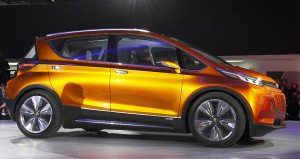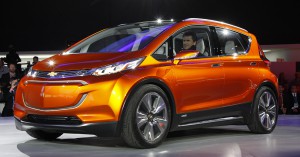
The Bolt will take on the planned Tesla Model III. GM officials confirmed the new EV will be built at it's plant in Orion Township, Michigan. Photo credit: Len Katz.
General Motors will launch production of its “game-changing” Bolt battery-electric vehicle, the maker announced during a speech at the Chicago Auto Show, confirming a report by TheDetroitBureau.com.
Delivering a promised 200 miles per charge, or more than twice what most current battery-cars offer, Chevrolet is betting the Bolt will serve as a “cure for range anxiety,” said Alan Batey, president of North American operations at General Motors.
But at a price tag estimated at around $30,000 after federal incentives are factored in, the Chevrolet Bolt will come in at less than half that of the current long-range mileage champ, the Tesla Model S. The Detroit battery-car also is on a fast track to production that seems likely to bring it to market ahead of Tesla’s own, more affordable model, the planned Model III.
Batey also confirmed that the new Bolt will be produced at the under-utilized GM Orion Assembly Plant in suburban Detroit where it currently produces another battery vehicle, a version of the Chevy Spark minicar.

The Chevy Bolt delivers significantly longer range than almost any current battery-electric vehicle - for around $30,000. Photo by Len Katz.
(Chevy Bolt makes Detroit debut alongside second-gen Volt plug-in. Click Here for the story.)
Batey declined to provide specific details, but TheDetroitBureau.com previously reported that the goal is to start rolling a production version of the Bolt down the line by the end of summer 2016 as a 2017 model.
Some sources have suggested that production volumes could reach as much as 25,000 to 30,000 a year.
That could depend on where fuel prices wind up by the time the Chevrolet Bolt reaches production. The market for battery-based vehicles, including hybrids, plug-ins and pure electrics, has tumbled in recent months, and the sharp decline in gas prices has generally been credited, or if you prefer, blamed.
For his part, Batey remained upbeat about the opportunities for selling Bolt even if gas stays well below its $4 peak, noting that saving money on gas “isn’t the only reason people buy (battery-based) vehicles.” Studies show that many customers are simply looking for green alternatives, while others want the latest in automotive technology.
That has clearly worked for Tesla which produced 35,000 Model S sedans last year despite the fact that at a price that can run as high as $110,000, it is difficult to ever recoup that investment through fuel savings.
(Tesla Losses Mount during final quarter of 2014, slow China debut catches blame. Click Here for the full story.)
But research shows that there are several other obstacles to more widespread acceptance of battery technology. Range anxiety is considered one of the most severe. Current battery-electric vehicles, such as the Ford Focus EV and Nissan Leaf, generally deliver no more than 75 to 100 miles per charge. Technically, that is more than enough to meet the typical motorist’s daily needs, but U.S. buyers traditionally want vehicles that can meet their most extreme needs, and a battery-car that starts out with the equivalent of barely a quarter tank of gas falls short for most potential customers.
Studies suggest that reaching at least 150 to 200 miles could overcome such concerns.
Price is the other big issue. Chevy is betting it would target the sweet spot of the market if a buyer could drive off the lot with a longer-range electric for around $30,000 – though that would be after factoring in an anticipated $7,500 federal tax credit.
Tesla is also shooting for that price range, and has set a goal of around $35,000 for the Model III – in this case, before incentives. The Silicon Valley start-up has been vague about timing, however. For the moment, it is finally hoping to get its second product line, the Model X SUV, into production by the third quarter of 2015, about two years late.
(Click Here for more on Nissan’s plans for the next-gen Leaf electric vehicle.)
Other makers are also targeting longer range for their own battery vehicles. As TheDetroitBureau.com recently reported, Nissan is working up a 200-mile version of its Leaf which is expected to reach market in several years.

Once again tax payers are subsidizing these impractical EVs being forced on car makers and consumers by the evil politics of Obama and the EPA. What a disgrace.
GMs “game changing” days are decades behind them. Styling cars after fish doesn’t make it. This terd ain’t gonna sell.
I almost got a Leaf…plenty of range back and forth to work. However, I travel 10-12 times a year and I want to be able to leave my car at the airport and not worry about getting back home.. the airport is 30 miles away and I have to deal with extreme cold and hot temps where I live. A bolt with 200 mile range I can leave at the airport and trust I’ll make it home when return…
This should be priced at half of what it says, 15k. The volt was too high despite a good test drive. I wont set foot in a nissan or BMW dealer. The Cad ELR is nice but also overpriced. Cut the price if you really expect average Americans to buy EVs.
Rick, Consider that the Bolt will likely have something north of 45 kilowatt-hours of lithium-ion batteries. A couple years ago, that would have cost GM almost $45,000. The price of LIon batteries has been plunging but will likely run it $400 or so a kWh, according to my GM sources, so we’re still talking about the batteries alone costing the maker near (or more than) $20,000. Oh, and then you have to build the car itself.
Paul A. Eisenstein
Publisher, TheDetroitBureau.com